Flo Ballard (June 30, 1943 – February 22, 1976) – Love Ain't Love (1968)
The Supremes co-founder and original lead singer had the group's most powerful voice, as evidenced by the superb solo single Van McCoy wrote for her.
View most updated version of this post on Substack
Search our full archives
Flo Ballard was one of the founding members of the Supremes, Motown’s biggest stars and the most commercially successful American vocal group of all time. Considered by many including Marvin Gaye and her fellow original member Mary Wilson to have had the best voice in the group, she was their original lead vocalist during live performances. Her talent was nonetheless forced to take a backseat when Berry Gordy elevated Diana Ross to the position of lead singer.
Ballard was forced out of the Supremes in 1967 (and replaced with former Patti LaBelle and the Bluebelles singer Cindy Birdsong), at which point she attempted to start a solo career that did not launch. She was given a bad financial deal by Motown on her way out the door, cheated out of a larger settlement by a crooked lawyer, and fell into alcoholism and poverty before her tragic early death at age 32.
Born and raised in Detroit, Florence Glenda Ballard was one of more than a dozen siblings. Her father Jesse was an amateur musician, and would play his guitar while teaching her the first songs she ever sang. He worked at a GM plant, and their family moved several times before securing an apartment in the city’s largest public housing complex, the Brewster-Douglass Housing Projects. Ballard was 15 at the time, and her father died of cancer the following year.
Ballard first met Mary Wilson at a junior high talent show, and they became friends in high school. In 1959, Ballard successfully auditioned for a spot in the Primettes, who were being assembled as a sister group to the popular local R&B group the Primes that featured Eddie Kendricks and Paul Williams. She then convinced Wilson to join the group. Williams filled out the lineup with one of his neighbors, 15-year old Diane Ross, and his then-girlfriend Betty McGlown.
They performed at talent shows and school dances around the city, with Ballard usually on lead vocals, and after winning a talent competition in Windsor, Ontario in 1960 were asked to audition for Berry Gordy’s new Motown label by songwriter and A&R executive Bob Bateman. He was soon to become Brian Holland’s early writing and production partner, a partnership that would strike gold when they co-wrote and co-produced “Please Mr. Postman” for the Marvelettes in 1961, Motown’s first #1 hit on the Billboard Hot 100.
The Primettes eventually auditioned for several Motown execs including Berry Gordy, who told them to finish high school and then try again. Ballard ended up dropping out, although the rest of the group’s members graduated. A violent crime pushed her to leave school and emotionally scarred her for life. She was allegedly raped at knifepoint by high school basketball star and future NBA player Reggie Harding, who was arrested eleven times during his short career before being murdered in 1972. It happened in an empty parking lot after she left a sock hop at the city’s Graystone Ballroom by herself one night, and although she told Wilson and Ross what had happened weeks later, never spoke of it again.
Having resolved to get on board the Motown bandwagon, the Primettes showed up at the label’s Hitsville U.S.A. headquarters daily, volunteering their services as backing vocalists. By the end of 1960, Gordy let them start recording their own songs in the studio, and in early 1961 agreed to sign them on the condition they change their name. Ballard was the only member in the studio at the time when Motown songwriter and secretary Janie Bradford (who co-wrote Barrett Strong’s “Money” with Gordy) gave her a list of new names to choose from, and she selected “Supremes.” They were officially signed on January 15, 1961.
During their first two years at Motown, the Supremes struggled to release a hit record. Their first single, the haunting “I Want a Guy” (co-written by Gordy, Brian Holland and Freddie Gorman) was backed with the beautiful doo-wop ballad “Never Again” (solely written by Gordy), with Diane on lead vocals on both tracks. It came out in March, 1961 but failed to chart.
That July, it was closely followed by the raw, rockin’ R&B cut “Buttered Popcorn,” with Flo on lead vocals. A double entendre-packed number, it was co-written by Gordy and the company’s Italian-American national sales and promotion manager “Barney” Ales. “Buttered Popcorn” showcased Ballard’s amazing voice, so powerful that according to Wilson, she was required to stand 17 feet back from the microphone during most of the group’s recording sessions. It was the only Supremes song ever released to feature her solely on lead vocals.
Gordy was determined to see Ross become the group’s main lead singer. His motivations have been analyzed for decades. He claimed in his autobiography Ross’ voice “stopped me in my tracks” when he first heard the group auditioning, and that it was more suited to the crossover white audience he hoped the Supremes would appeal to. Ballard’s vocals, by contrast, were deemed “too soulful” for her to remain the group’s lead. But many chalk it up to Gordy’s romantic attraction to Ross, who he entered into a relationship with from 1965-70. As one longtime Motown observer put it:
“I lived in Detroit, and everyone knew what happened…Berry had his own agenda. He wanted Diane for himself. It didn't matter that he was married, so he made her lead, and they started dating. Florence had the better voice, but Berry wouldn't let her sing.”
Even on this one single, for which the label’s Quality Control department determined “Buttered Popcorn” was the A-side worthy track, Gordy wanted the sides reversed in favor of the Ross-led cover of “Who's Lovin' You” by the Miracles. They compromised by agreeing to issue it as a double-A side.
It was a regional hit in Detroit and other Midwest cities, but a number of developments prevented it from charting nationally. The original version was said to be “too raw” and withdrawn, replaced on subsequent pressings by an inferior, watered down take. After Motown finally realized its lyrics could be interpreted to have a sexual double meaning, they stopped promoting “Buttered Popcorn” and tried pushing “Who's Lovin' You” before giving up on the single altogether. Gordy likely had a hand in these decisions.
The Supremes finally made it onto the charts in 1962, and had their first real hit late that year with the #26 R&B “Let Me Go the Right Way,” written and produced by Gordy. A year later, they broke into the top-40 pop charts for the first time with “When The Lovelight Starts Shining Through His Eyes” which peaked at #2 R&B and #23 on the Hot 100 in the fall of 1963. It was the first song written and produced for them by Holland-Dozier-Holland, who from that point on became the group’s main producers until H-D-H left Motown in late 1967. Both hits featured Ross on lead vocals, and her position as the group’s lead singer was sealed.
With Holland-Dozier-Holland’s creative powers kicking into high gear behind them, the Supremes shot to international fame, with an astounding five #1 hits (“Where Did Our Love Go,” “Baby Love,” “Come See About Me,” “Stop! In the Name of Love,” and “Back in My Arms Again”) charting on the Hot 100 over a year’s time from June, 1964 to June, 1965.
When they released their tribute cover album We Remember Sam Cooke in the spring of 1965, its upbeat closing cut was “Ain’t That (Good News),” featuring Ballard on lead vocals. It demonstrated what a powerful voice she had for all the world to hear, and made many fans wonder why she wasn’t singing lead more often.
Ballard wondered the same thing herself, and battled depression over being relegated to life as a backing vocalist in the group she once led. She turned to alcohol to self-medicate, which led to her missing performances and recording sessions. In April, 1967, Gordy asked Patti LaBelle and the Bluebelles singer Cindy Birdsong to replace her. One supposedly inside source claimed to know why she was chosen:
“Berry and Diane knew one of the Bluebelles had a first soprano and they hoped it was Cindy who bore a mild resemblance to Flo from a distance. But it was actually Sarah Dash who had the first soprano so they wound up with what sounds like two altos behind Diane.”
See our earlier post on Cindy Birdsong for more on the secret preparations Gordy made for her to take Ballard's place. He changed the group’s name to “The Supremes with Diana Ross” that June. Birdsong officially began performing with them on July 1, 1967, the day after Ballard’s 24th birthday, and the night Ballard was told by Gordy she was being fired. She talked about this night in detail in a series of interviews conducted by Detroit Free Press journalist Peter Benjaminson in 1975, mere months before her death.
Motown originally offered her a paltry $15,000 to terminate her contract, buying out her rights to “The Supremes” name and any royalties she was owed. She told one of the company’s vice presidents Michael Roshkind they could “stick it up their asses,” but signed the papers anyway. She then hired attorney Leonard Baun, who negotiated a larger settlement in the amount of $139,804.94. But Ballard never saw any of that money, and Baun was later indicted on multiple embezzlement charges after similarly ripping off many other clients.
In March, 1968, she signed with ABC Records. Her debut solo single was recorded that spring at ABC’s studios in New York. The upbeat pop song “It Doesn't Matter How I Say It (It's What I Say That Matters)” was the A-side, b/w a stellar cover of “Goin’ Out Of My Head,” originally a top-ten hit for Little Anthony and the Imperials in 1964. Both sides were produced by George Kerr (who himself had briefly been a member of the Imperials) and arranged by Richard Tee.
The single did not chart. As Ballard recalled in her interviews with Benjaminson, “the company released the record, but they just wouldn't push it.” Despite the fact that she signed a release forbidding her to use the Supremes name in any way, it was gross negligence on the label’s part not to have found a way to capitalize on what was her first solo recording. But her business manager at the time was her new husband Tommy Chapman, a former Motown chauffeur, who was too inexperienced to do anything about it.
That August, Ballard went back into the studio and recorded her second single, the superb Van McCoy-penned “Love Ain’t Love” which he wrote specifically for Ballard. It was arranged by the unsung genius arranger/producer Bert DeCoteaux.
This time the tracks were produced by Bob Bateman, who had first invited the Primettes to come audition for Motown eight years earlier.
Bateman co-wrote the B-side, a heartfelt love song titled “Forever Faithful” whose lyrics could be read as a farewell message from Flo to the Supremes. After the single was released in October, 1968, Chapman drove to radio stations and record stores with boxes of them, distributing promo copies far and wide. But it did no good.
When “Love Ain’t Love” failed to chart, ABC shelved what was supposed to be her debut solo album, You Don't Have To. The lost LP’s tracks were widely bootlegged over the years, yet remained unreleased until 2001, when the tribute album The Supreme Florence Ballard was released on CD by Universal Music Group’s Spectrum Music subsidiary. It compiled both her ABC singles, the material recorded for her shelved album, and four early Supremes tracks featuring Flo on lead vocals (including “Buttered Popcorn” and “Ain’t That (Good News)”). But in an unfortunate twist of fate, its release date was September 18, exactly one week after the 9/11 terrorist attacks, and the album went largely unnoticed at the time.
All of You Don't Have To’s planned tracks save for “Love Ain’t Love” and “Forever Faithful” were recorded in March and April of 1968 and produced by Kerr. The upbeat jam “Like You Babe” would have been a hit, credited to the unknown songwriters “Thomas/Harold/Thyandic.”
The beautiful love song “Yours Until Tomorrow” was co-written by Carole King and Gerry Goffin, and Kerr co-wrote the laid back “You Bring Out The Sweetness In Me” with his frequent songwriting collaborator Gerald Harris. “Everything Wonderful” was written by Drake Hollon, who also wrote Ballard’s first ABC single “It Doesn't Matter How I Say It (It's What I Say That Matters)”
One of the most enchanting tracks included on The Supreme Florence Ballard was also the most mysterious. Presumably recorded in 1968, both the writers and producer(s) of "My Heart" are unknown, but Ballard's flawless vocals made it a love song for the ages.
After losing a 1971 lawsuit against Motown seeking $8.7 million in additional royalty payments, she and Chapman separated, and she lost her house to foreclosure. In 1972 she moved into her sister Maxine’s house, becoming an alcoholic and sinking into poverty. Ballard applied for welfare in 1974 and the story of her financial plight broke in newspapers. She spent six weeks in rehab at Detroit’s Henry Ford Hospital, after which she stopped drinking.
The following year, Ballard received a settlement from her former attorney Baun’s insurance company and was able to buy a new home. She and Chapman got back together, and she decided to return to her singing career. Her first live performance was on June 25, 1975 at a benefit concert in Detroit.
Eight months later, on February 21, 1976, she checked herself into the hospital after experiencing numbness in her hands and feet. She died of a heart attack caused by a blood clot the next morning, gone far too soon at age 32. In death, as in life, she deserved much better.
Rest in Peace, Flo Ballard.
Further info:
“Where Did Their Love Go?,” The New York Times, October 26, 1986.
The Lost Supreme: The Life of Dreamgirl Florence Ballard, by Peter Benjaminson, Lawrence Hill Books, 2009.
“Remembering Diana Ross's Appalling Behavior at Flo Ballard's Funeral,” by Michael Musto, The Village Voice, June 28, 2010.
“Supremes' Mary Wilson Talks Diana Ross, Flo Ballard, and Money,” Black Enterprise, May 4, 2016.
“For $10,000, a book disappears,” by Adam White, West Grand Blog, January 11, 2019.
#soul #Motown #TheSupremes #FloBallard




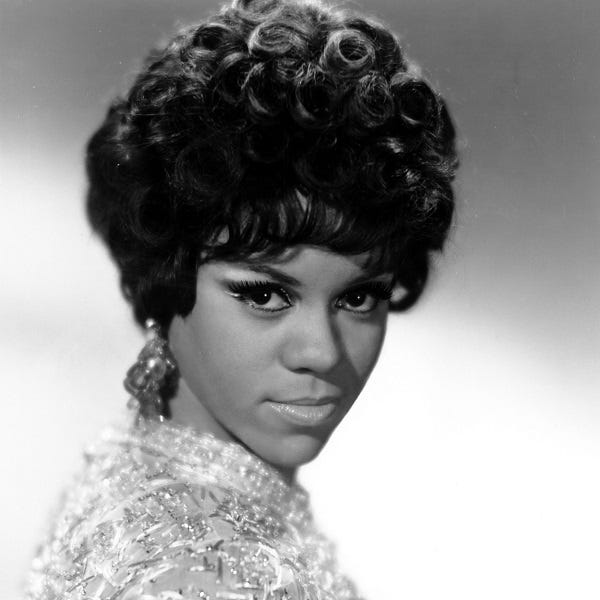
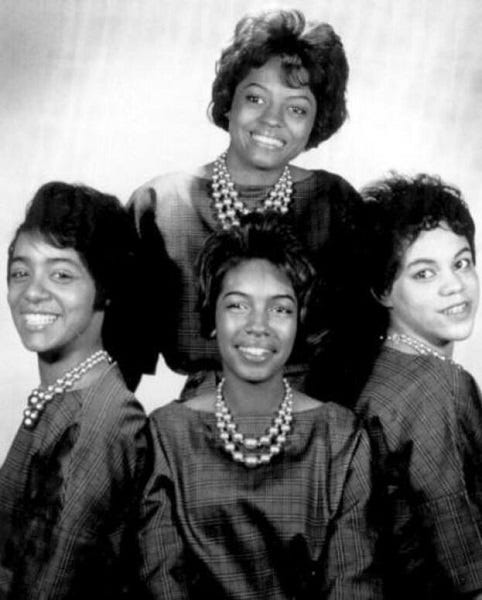

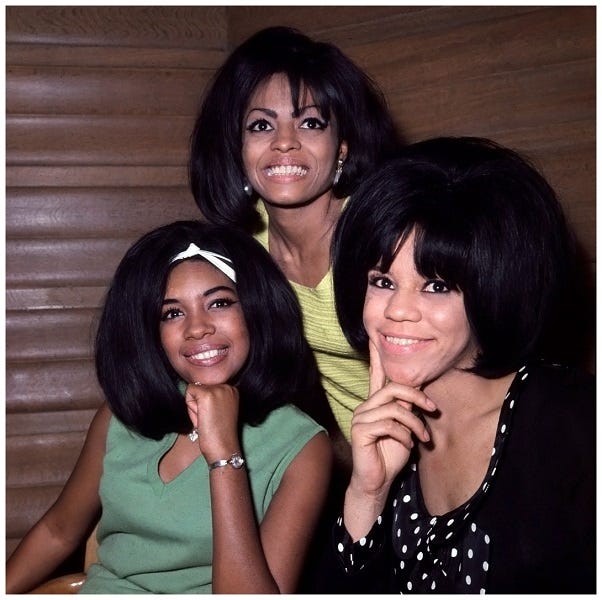
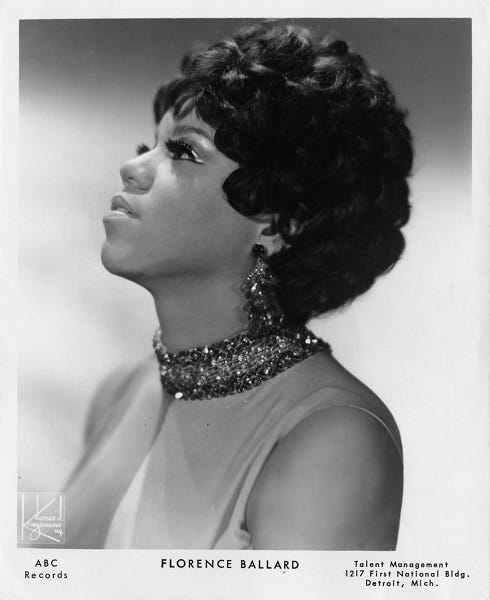

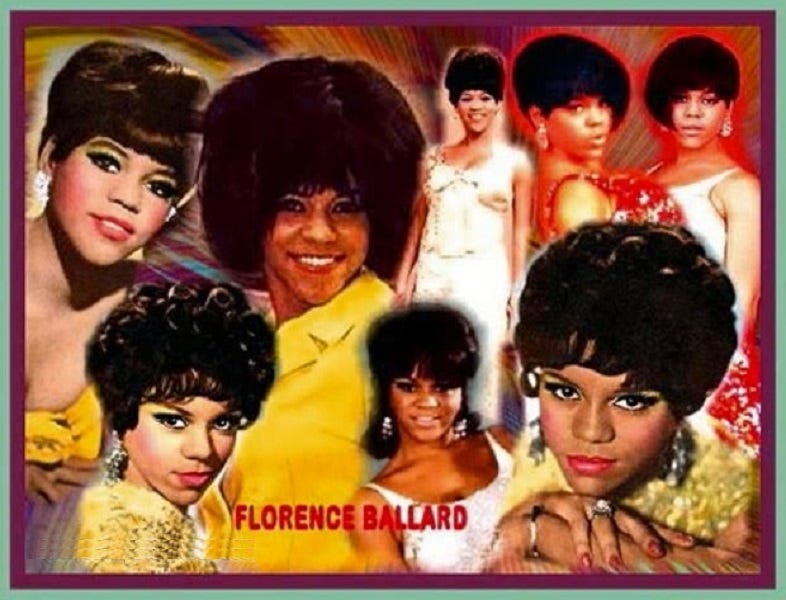
Some of this is not true. She wasn't forced out of the group. Read Mary Wilson's book; Dreamgirls.